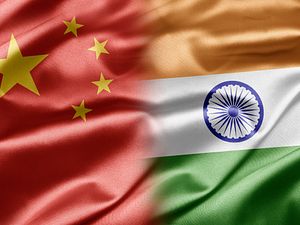The impending withdrawal of U.S. and NATO troops from Afghanistan presents a compelling opportunity for strategic cooperation between India and China. Although bilateral relations between the two remain troubled by territorial disputes and imbalanced trade, both countries’ interests seem to overlap in Afghanistan.
The most obvious area of concern for both India and China is the domestic security situation in Afghanistan — neither would like to see Afghanistan turn into a haven for Islamic terror groups following the U.S. withdrawal. Furthermore, should the United States and Afghanistan fail to conclude the Bilateral Security Agreement in time, India and China will be motivated even further. While China has seen opportunities for investment in Afghanistan, it is becoming increasingly apparent that its foreign policy towards the country is being driven more by security concerns.
During a recent visit to the country, Chinese Foreign Minister Wang Yi emphasized the importance of domestic stability in Afghanistan for the internal stability of China’s western province on Xinjiang. For China, the possibility of Afghanistan turning into a permanent place of refuge for insurgents and terrorists that would eventually foment unrest in Xinjiang is anathema. Wang’s counterpart reassured him that Afghanistan “would never allow the ETIM [East Turkestan Islamic Movement] to take advantage of the Afghan territory to engage in activities endangering China, and will continuously deepen security cooperation with the Chinese side.”
Similar to China, the Indian government and Indian investors have shown great interest in emerging opportunities in Afghanistan in mining, hydrocarbons, infrastructure development, and other sectors. Despite India’s formidable commercial interests in Afghanistan, there is also a strong strategic push to prevent the country from succumbing to domestic instability. Keeping the Taliban at bay in Afghanistan is paramount for India.
India’s interests in Afghanistan are also tied to its concerns about Pakistan and Pakistan-based terror groups such as as Lashkar-e-Taiba (LeT). LeT most infamously staged the 2008 Mumbai terror attacks, which killed over 180. It is known to operate in Afghanistan where it bombed the Indian embassy in 2008; in April 2013, ISAF forces apprehended a senior LeT leader in Ghazni province.
On the surface, it would appear that given China’s close partnership with Pakistan, India-China cooperation in Afghanistan would necessarily be superficial and limited. However, Pakistan and China find themselves at odds in Afghanistan. For Pakistan (particularly its military), the overwhelming strategic objective in Afghanistan is to undermine Kabul’s ability to govern the rest of the country and maintain Afghanistan as a subordinate backyard, free from foreign influence. This has effectively been the dictum that Pakistan’s elites have aimed for since the Soviet invasion of Afghanistan. This objective is incompatible with China’s interests in Afghanistan and will likely lead to some friction between these allies. Pakistan is central to Afghanistan’s fate, but it will likely be unable to condition the manner in which India and China cooperate in that country.
The groundwork for deeper cooperation between India and China seems to exist, but not particularly on a bilateral level between the two countries. India, China, and Russia have had several trilateral dialogues on cooperation in Afghanistan. Despite this, Afghanistan did not feature in Manmohan Singh’s October 2013 trip to Beijing when he spoke with Chinese Premier Li Keqiang. New developments are slightly more promising. Over the weekend, Indian Foreign Secretary Sujata Singh traveled to Beijing to speak with Chinese Vice Foreign Minister Zhu Zhenmin. The meeting presented a rare opportunity for the two countries to exchange views on their mutual concerns in Afghanistan.
Ultimately, there is room for cooperation between India and China in Afghanistan following the exit of the United States and NATO. Whether Asia’s two giants will be able to capitalize on the opportunity will depend on several factors. While India’s current government has been willing to approach China about Afghanistan, it remains to be seen if the next government — possibly led by the opposition Bharatiya Janata Party (BJP) — will be as interested in bilateral and multilateral cooperation. For China, the more it grows involved in Afghanistan, the more it will find itself at odds with its supposed “all-weather” partner Pakistan. While uncertainties abound in how exactly India and China will approach Afghanistan, what remains certain is that Afghanistan will continue to be a nexus of geopolitical interest for its neighbors.

































